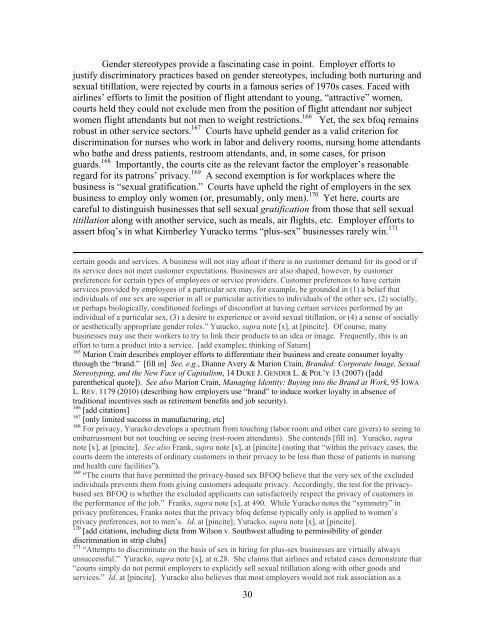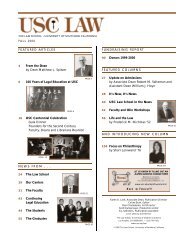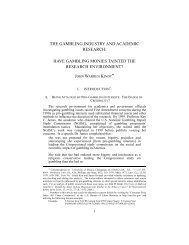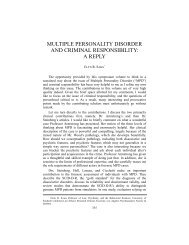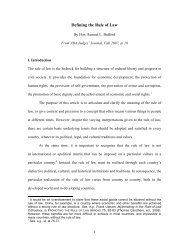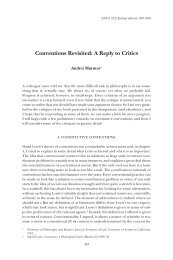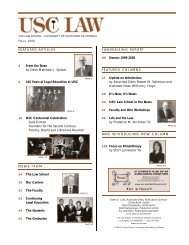1 Regulating Sex Work Adrienne D. Davis VERY ROUGH DRAFT ...
1 Regulating Sex Work Adrienne D. Davis VERY ROUGH DRAFT ...
1 Regulating Sex Work Adrienne D. Davis VERY ROUGH DRAFT ...
Create successful ePaper yourself
Turn your PDF publications into a flip-book with our unique Google optimized e-Paper software.
Gender stereotypes provide a fascinating case in point. Employer efforts to<br />
justify discriminatory practices based on gender stereotypes, including both nurturing and<br />
sexual titillation, were rejected by courts in a famous series of 1970s cases. Faced with<br />
airlines’ efforts to limit the position of flight attendant to young, “attractive” women,<br />
courts held they could not exclude men from the position of flight attendant nor subject<br />
women flight attendants but not men to weight restrictions. 166 Yet, the sex bfoq remains<br />
robust in other service sectors. 167 Courts have upheld gender as a valid criterion for<br />
discrimination for nurses who work in labor and delivery rooms, nursing home attendants<br />
who bathe and dress patients, restroom attendants, and, in some cases, for prison<br />
guards. 168 Importantly, the courts cite as the relevant factor the employer’s reasonable<br />
regard for its patrons’ privacy. 169 A second exemption is for workplaces where the<br />
business is “sexual gratification.” Courts have upheld the right of employers in the sex<br />
business to employ only women (or, presumably, only men). 170 Yet here, courts are<br />
careful to distinguish businesses that sell sexual gratification from those that sell sexual<br />
titillation along with another service, such as meals, air flights, etc. Employer efforts to<br />
assert bfoq’s in what Kimberley Yuracko terms “plus-sex” businesses rarely win. 171<br />
certain goods and services. A business will not stay afloat if there is no customer demand for its good or if<br />
its service does not meet customer expectations. Businesses are also shaped, however, by customer<br />
preferences for certain types of employees or service providers. Customer preferences to have certain<br />
services provided by employees of a particular sex may, for example, be grounded in (1) a belief that<br />
individuals of one sex are superior in all or particular activities to individuals of the other sex, (2) socially,<br />
or perhaps biologically, conditioned feelings of discomfort at having certain services performed by an<br />
individual of a particular sex, (3) a desire to experience or avoid sexual titillation, or (4) a sense of socially<br />
or aesthetically appropriate gender roles.” Yuracko, supra note [x], at [pincite]. Of course, many<br />
businesses may use their workers to try to link their products to an idea or image. Frequently, this is an<br />
effort to turn a product into a service. [add examples; thinking of Saturn]<br />
165<br />
Marion Crain describes employer efforts to differentiate their business and create consumer loyalty<br />
through the “brand.” [fill in] See, e.g., Dianne Avery & Marion Crain, Branded: Corporate Image, <strong>Sex</strong>ual<br />
Stereotyping, and the New Face of Capitalism, 14 DUKE J. GENDER L. & POL’Y 13 (2007) ([add<br />
parenthetical quote]). See also Marion Crain, Managing Identity: Buying into the Brand at <strong>Work</strong>, 95 IOWA<br />
L. REV. 1179 (2010) (describing how employers use “brand” to induce worker loyalty in absence of<br />
traditional incentives such as retirement benefits and job security).<br />
166<br />
[add citations]<br />
167<br />
[only limited success in manufacturing, etc]<br />
168<br />
For privacy, Yuracko develops a spectrum from touching (labor room and other care givers) to seeing to<br />
embarrassment but not touching or seeing (rest-room attendants). She contends [fill in]. Yuracko, supra<br />
note [x], at [pincite]. See also Frank, supra note [x], at [pincite] (noting that “within the privacy cases, the<br />
courts deem the interests of ordinary customers in their privacy to be less than those of patients in nursing<br />
and health care facilities”).<br />
169<br />
“The courts that have permitted the privacy-based sex BFOQ believe that the very sex of the excluded<br />
individuals prevents them from giving customers adequate privacy. Accordingly, the test for the privacybased<br />
sex BFOQ is whether the excluded applicants can satisfactorily respect the privacy of customers in<br />
the performance of the job.” Franks, supra note [x], at 490. While Yuracko notes the “symmetry” in<br />
privacy preferences, Franks notes that the privacy bfoq defense typically only is applied to women’s<br />
privacy preferences, not to men’s. Id. at [pincite]; Yuracko, supra note [x], at [pincite].<br />
170<br />
[add citations, including dicta from Wilson v. Southwest alluding to permissibility of gender<br />
discrimination in strip clubs]<br />
171<br />
“Attempts to discriminate on the basis of sex in hiring for plus-sex businesses are virtually always<br />
unsuccessful.” Yuracko, supra note [x], at n.28. She claims that airlines and related cases demonstrate that<br />
“courts simply do not permit employers to explicitly sell sexual titillation along with other goods and<br />
services.” Id. at [pincite]. Yuracko also believes that most employers would not risk association as a<br />
30


